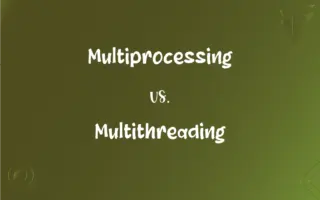Hindu Dharma vs. Sanatana Dharma: What's the Difference?
Edited by Aimie Carlson || By Janet White || Published on February 25, 2024
Hindu Dharma refers to the religious and social practices of Hinduism, while Sanatana Dharma represents the eternal, universal truths and duties underlying Hindu teachings.

Key Differences
Hindu Dharma encompasses the religious practices, rituals, and beliefs specifically associated with Hinduism. In contrast, Sanatana Dharma, translating to "eternal duty," refers to the universal and timeless principles that Hinduism is built upon.
Hindu Dharma is characterized by its diversity of gods, practices, and philosophical systems. Sanatana Dharma, however, emphasizes universal concepts like truth, righteousness, peace, love, and non-violence, which are fundamental to Hindu thought.
Hindu Dharma includes the various scriptures like the Vedas, Upanishads, Bhagavad Gita, and Ramayana, which guide the religious aspects of Hinduism, while Sanatana Dharma is more about the moral and ethical principles derived from these texts, applicable universally.
In Hindu Dharma, customs and rituals vary greatly across different regions and communities, reflecting a wide cultural diversity. Sanatana Dharma, on the other hand, represents the core values and philosophies that are consistent across these diverse practices.
The term Hindu Dharma often denotes the identity and practices of people following Hinduism, including temple worship, festivals, and pilgrimages. Sanatana Dharma, by contrast, transcends religious identity, emphasizing a way of life and spiritual realization that extends beyond formal religious practice.
ADVERTISEMENT
Comparison Chart
Definition
Religious practices of Hinduism
Eternal, universal truths of Hinduism
Scope
Specific to Hindu religious identity
Universal and timeless principles
Focus
Rituals, deities, scriptures
Moral, ethical principles
Cultural Variation
Diverse across regions and communities
Consistent core values and philosophies
Relation to Religious Identity
Tied to Hindu identity
Transcends religious identity
ADVERTISEMENT
Hindu Dharma and Sanatana Dharma Definitions
Hindu Dharma
It is the way of life and beliefs of people following Hinduism.
Pilgrimage to Varanasi is an aspect of Hindu Dharma.
Sanatana Dharma
It refers to the timeless, spiritual truths underlying Hindu practices.
Seeking spiritual enlightenment aligns with Sanatana Dharma.
Hindu Dharma
Hindu Dharma includes rituals, worship, and festivals of Hindu culture.
The ritual of Aarti is integral to Hindu Dharma.
Sanatana Dharma
Sanatana Dharma represents the eternal, universal truths in Hinduism.
Practicing non-violence is a principle of Sanatana Dharma.
Hindu Dharma
Hindu Dharma encompasses the religious practices of Hinduism.
Celebrating Diwali is a part of Hindu Dharma.
Sanatana Dharma
It is the foundational duties and ethical principles of Hindu philosophy.
The pursuit of truth is central to Sanatana Dharma.
Hindu Dharma
It refers to the adherence to Hindu scriptures and teachings.
Reading the Bhagavad Gita is encouraged in Hindu Dharma.
Sanatana Dharma
Sanatana Dharma transcends religious boundaries, emphasizing universality.
The concept of karma is a key aspect of Sanatana Dharma.
Hindu Dharma
Hindu Dharma embodies the diverse philosophical systems of Hinduism.
Following the principles of yoga is a part of Hindu Dharma.
Sanatana Dharma
Sanatana Dharma focuses on universal love, righteousness, and peace.
Living in harmony with nature is encouraged by Sanatana Dharma.
FAQs
How is Hindu Dharma practiced?
Through rituals, worship, festivals, and adherence to Hindu scriptures.
What is Hindu Dharma?
It's the religious and social practices associated with Hinduism.
What does Sanatana Dharma mean?
It refers to the eternal, universal truths and duties in Hinduism.
Does Hindu Dharma vary across regions?
Yes, it shows great diversity in practices and rituals.
What role does karma play in Sanatana Dharma?
It's a key concept, emphasizing actions and their consequences.
What are the core principles of Sanatana Dharma?
Truth, righteousness, peace, love, and non-violence.
Does Hindu Dharma have a single founder?
No, it evolved over millennia with contributions from many sages.
Can someone of another faith follow Sanatana Dharma?
Yes, as it embodies universal truths applicable to all.
Does Sanatana Dharma advocate for a specific deity?
No, it focuses on universal principles rather than specific deities.
Are the Vedas part of Hindu Dharma?
Yes, they are central scriptures in Hindu Dharma.
Are caste and social structure integral to Hindu Dharma?
Historically, they have been part of its social aspect, though debated.
How do festivals fit into Hindu Dharma?
They are important cultural expressions of Hindu religious beliefs.
Is yoga a part of Sanatana Dharma?
Yes, as a spiritual practice aiming for union with the universal truth.
Is Sanatana Dharma exclusive to Hinduism?
No, it transcends religious boundaries with its universal principles.
Is the concept of moksha related to Sanatana Dharma?
Yes, it's the ultimate goal of spiritual liberation in Sanatana Dharma.
Do Hindu Dharma and Sanatana Dharma differ in their view of the afterlife?
Hindu Dharma offers various views, while Sanatana Dharma focuses on the soul's eternal journey.
How does Hindu Dharma address morality?
Through its diverse scriptures and teachings on ethical living.
Is meditation part of Sanatana Dharma?
Yes, it's a practice encouraged for spiritual realization.
Does Sanatana Dharma align with modern values?
Its core principles of universality and ethics are often seen as timeless.
Can Hindu Dharma adapt to changes in society?
Yes, it has a history of evolving with time and culture.
About Author
Written by
Janet WhiteJanet White has been an esteemed writer and blogger for Difference Wiki. Holding a Master's degree in Science and Medical Journalism from the prestigious Boston University, she has consistently demonstrated her expertise and passion for her field. When she's not immersed in her work, Janet relishes her time exercising, delving into a good book, and cherishing moments with friends and family.
Edited by
Aimie CarlsonAimie Carlson, holding a master's degree in English literature, is a fervent English language enthusiast. She lends her writing talents to Difference Wiki, a prominent website that specializes in comparisons, offering readers insightful analyses that both captivate and inform.






































































